- Home
- Marthe Jocelyn
A Big Dose of Lucky
A Big Dose of Lucky Read online
IN EARLY JUNE 1964, the Benevolent Home for Necessitous Girls burns to the ground, and its vulnerable residents are thrust out into the world. The orphans, who know no other home, find their lives changed in an instant. Arrangements are made for the youngest residents, but the seven oldest girls are sent on their way with little more than a clue or two to their pasts and the hope of learning about the families they have never known. On their own for the first time in their lives, they are about to experience the world in ways they never imagined…
For more Secrets:
ReadtheSecrets.com
A BIG
DOSE OF
LUCKY
MARTHE JOCELYN
O R C A B O O K P U B L I S H E R S
For all the donor offspring who might be
curious to find their birth families.
Table of Contents
ONE
TWO
THREE
FOUR
FIVE
SIX
SEVEN
EIGHT
NINE
TEN
ELEVEN
TWELVE
THIRTEEN
FOURTEEN
FIFTEEN
SIXTEEN
SEVENTEEN
ACKNOWLEDGMENTS
ONE
IT BEGINS WITH THE FIRE
Or maybe a few hours earlier, when I walk into town on a Saturday afternoon to buy, you know, girl products.
I don't go shopping by myself too often. Usually I'm with one of the other girls from the Home—Toni or Betty or my roommate, Cady, or Sara sometimes. I follow along and they don't mind, even if I'm the one people notice. I'm the dark one or the little darkie or the colored girl. I’m not saying there’s anything especially special to know about me, but still. I have a name.
People in town don’t give a hoot about our names or who our parents might have been other than dead. They feel sorry for us—because of the dead part—but otherwise we’re part of who they are. Like at Greene’s Bakery when Mrs. Greene puts an extra cookie in the bag and says real loud, And here’s another treat for good luck, so everyone in the store knows how generous she is. Or at the newsstand when Mr. Arnold saves last month’s issues of Teen Screen magazine and tells other shoppers he keeps them ’specially for the orphans. (We’re not complaining. We like free cookies, and we love getting new pinups of the Beatles or Hayley Mills or Elvis Presley.) Sometimes when we go to town we play a game called Poor Little Me. Whoever gets the most free stuff from shopkeepers wins. Then we divvy it all up and share everything. Which works in my favor, because the darkie doesn’t win too often.
I decided on my birthday two weeks ago, when I turned sixteen, that I’d be braver about things like going to town alone. Today is the test, since the other Sevens are all busy. That’s us, the oldest ones, with Sara oldest of all. We’re the Seven. We’ve been here pretty much since we were born and grown up together like sisters.
Today, while I’ve got the money, I want to stock up on girl stuff from Pitt’s Drugs and Sundries. I don’t like to request it from the matron, because then she keeps asking—sometimes right in front of other people—Everything all right with your monthly? Better to be prepared.
So I’m in line holding the box, plus Noxema for my face, but there are two boys in front of me, nudging each other. Waiting to buy boy things, as it turns out, because they ask Mr. Pitt to get something from behind the counter and that’s what’s making them red-faced and shifty-eyed. One of the boys, I know who he is. He’s the one Sara goes with. Cute, maybe, but mean. I take a quick look at the box Mr. Pitt gives him, wondering. I don’t know exactly how those things work, but I know boys use them when they plan to touch girls all over and shoot minnows. Are those to use with Sara? Does she do that with him?
And suddenly he’s knocking my arm. “What’re you staring at, blackie?” he says.
“Nothing.” Face hot as heck. “I’m not.”
Why do I say anything when he calls me that?
Because they teach us at the Home that it’s rude not to answer when you’re spoken to.
“We’ll have no rough talk in here,” says Mr. Pitt, giving the boys their change. “Off you go now.”
The boys leave and now it’s my turn to avoid the druggist’s eye. He slides my box and the blue Noxema jar into a brown paper bag so no one but him has to know that it’s nearly my time of the month.
Outside, though, the boys are waiting, and now it’s four of them instead of two. Sara’s boy leans against the telephone pole, smirking at me, smoking a cigarette.
“Get what you needed, blackie?” he says.
“Aw, Luke,” says one of his buddies. “Leave her alone.”
But Luke snatches the bag right out of my hand and tears it open.
“What have we here?” He yanks out the box, drops the bag, and I hear a crack as the glass Noxema jar hits the cement.
“Blackie’s got the curse!” Luke waves the box likes it’s a trophy he just ran a race for, and the other boys cheer. He tosses the box to one of his pals while I want to die nine deaths right there on the sidewalk.
Mr. Pitt opens the door and steps out, jabbing a broom into the air. “You scram, kids! I’ve told you before, no loitering on my premises.”
The boys laugh, but the game is over anyway. My box is dropped, and Luke moves in to step on it with his big shoe.
“Oops,” he says.
I wait till they’re gone to pick up the squished box and the bag with the broken glass and white cream soaking through.
Mr. Pitt shakes his head. “I’ll take that,” he says. “Straight into the bin. Come get yourself replacements, half price.”
If I skip the Noxema, I’ll have nearly enough. Mr. Pitt lets me promise the extra fourteen cents next time I come to his store.
Which turns out to be never.
LAST YEAR
The president of the United States was shot with a rifle, like a rabbit, and killed. With hundreds of people watching. Miss Webster told us the news, crying her eyes out. Then Mrs. Hazelton, also teary, gathered us Sevens in the common room and told us again, in a cracking voice. I don’t think any of us understood why it mattered so much. None of us ever met him, and we’re not even Americans except for Jumpin’ Joe, the cook. They turned on the television right then, in the middle of the day, for us to watch the news. History unfolding, said Mrs. H. It made my insides feel like Jell-O, watching grownups holding on to each other, wiping tears off their cheeks. Men, even, with ties on, weeping. We could see he was a man who had given people hope, and now that hope had been blown up with a gunshot.
Later on, Joe told me that John Fitzgerald Kennedy Junior was the first president to get in trouble for suggesting that coloreds should be treated equal to anybody else. He’d asked a question in one of his speeches, a question that Joe was pretty sure no white person answered. Who among us would be content to have the color of his skin changed and stand in his place?
In the Home, it doesn’t matter what color I am. I’m just Malou. Maybe I’m Blackie in the town, but that’s just rude white boys like Luke calling me names. Who knows what happens anyplace else? I’ve only been here.
THE BENEVOLENT HOME FOR NECESSITOUS GIRLS
That’s where we live. Fancy words for something very simple: a place for girls with nowhere else to be.
BEDTIME
Getting the Littles ready for bed is the Seven’s evening chore, which might sound easy, because what’s so hard about watching a kid brush her teeth? Except there are seventeen Littles, and not all of them are friendly. They make me think of chipmunks—cute and chattery until you make them mad and then boom, you’re surrounded by rabid rodents who want to bite off your fingers.
&n
bsp; There used to be way more than seventeen, but the Home is closing. The way Mrs. Hazelton explains it, the government is shutting us down because of a new philosophy that children should be raised in families, not in institutions. Maybe they should ask the children. I’m guessing most of us would say not just any family. To me, the Seven are my sisters. Better than any family, except maybe the one that really belongs to me. And what are the chances of finding that?
Luckily, tonight is not a bath night, so we only have to get the Littles’ faces washed, their nails scrubbed and their teeth more or less rinsed.
Miss Webster, our home ec teacher, stays in the house at night, on the first floor with the smallest girls. And Joe the cook, who nearly never stops humming, is in his room off the kitchen, of course.
The routine is that after we’ve done the Littles and possibly some math or school reading, most of us land in Toni and Betty’s room. We complain about the teachers, Toni shows us dance moves, Sara moans about Luke. If Tess has sneaked out, we look through her magazines, that kind of thing.
If Miss Webster forgets about us or can’t be bothered to climb the stairs, we might play a game, like Truth or Dare? Answer a question truthfully or else accept a dare. Some of us find it harder to tell the truth than we do to perform weird or silly feats of daring. Living in a house with a lot of girls, you learn to protect yourself by not always saying what’s in your heart. It comes out often enough by accident. Especially if we skip Truth or Dare? and go straight to our favorite pastime: Who Am I?
ALL ORPHANS WONDER WHO THEIR PARENTS MIGHT BE
It’s something we talk about without end. We pretend to listen to each other, but really it’s an excuse to color the pictures in our own heads.
“I’ve been thinking,” Betty might begin, “that my father is a duke or a viscount instead of a prince. A prince gets watched too much. But one of the lesser royals, a cousin maybe, could sneak off and have a baby, right?”
Betty is stuck on the idea that one of her parents is royalty, so we play along, even though hello? How would she end up in Ontario if she were the daughter of even the most minor duke of the most minor monarchy?
Tess claims that she, Tess, is an alien waiting for the mother ship to come and rescue her from Earth. This seems way more likely than Betty’s scenario.
Dot changes her mind every week about which celebrities might be her parents. She thinks we don’t know that she writes to them on her Christmas stationery. If she ever actually sent one, what would someone like, for instance, Frankie Valli think? How about: What a weirdo! He’d toss it straight into the wastepaper basket, and all her dreaming would end up crumpled into a ball of pink paper.
In my fantasy, my family isn’t fancy or famous. And I’m not clear about what they look like, other than brown, and it doesn’t matter what they do for their jobs. Teachers? Or maybe they own a pet store. What I think about is sitting with them at a kitchen table or in cozy chairs beside a fire-place, playing cards. Sitting in the back of the car, going on vacation to a sunny place with water splashing against a sandy shore.
What I never say out loud during Who Am I? is that I secretly imagine that someone is keeping an eye on me the way Ram Dass does for Sara Crewe in A Little Princess, bringing her delicious food through the attic window and lighting a fire in the grate. Making her feel as if she is looked after even though her father is gone. Or in Anne of Green Gables when dear old Matthew Cuthbert goes to buy a dress for Anne, insisting on puffed sleeves because he cares enough to fulfill her heart’s desire. Wouldn’t that be the most amazing thing? First, having a heart’s desire. And then, having it fulfilled.
I don’t know who my parents were. I hope they loved me.
But mostly I wonder how they died.
HOW PARENTS DIE
Orphans are very popular literary characters, and I’ve read every story about motherless waifs that I could get my hands on. It began when I was nine and found a book in the library called Heidi’s Years of Wandering and Learning. Heidi became an orphan when she was one year old. Her aunt Dete—there are lots of aunts in stories about orphans, mostly mean ones—eventually takes Heidi to live with Heidi’s grouchy old grandfather in a hut on a mountain. Being a little ball of sunshine, Heidi makes friends with everyone she meets, including the miserable grandpa.
That started a literary obsession for me, and our matron, Mrs. Hazelton, let me read and read. Whenever a new story was published that featured a child facing the world without parents, it appeared in the Home’s library. I read them all. I wanted to know, How did this happen to me?
I KEEP A LIST OF HOW PARENTS IN BOOKS DIE
Sara Crewe’s father died of a brain fever.
Jane Eyre’s father died of typhus. We know he was a good man because he caught the illness while caring for poor people.
Tarzan’s father was killed by Kerchak, king of the very same ape tribe that turned around and raised little orphan Tarzan, teaching him to swing from vines and holler like a monkey.
James explored the insides of a giant peach after both his parents were killed by a stampeding rhinoceros.
See? The mothers often die during childbirth while the fathers get ill or have an accident, but no author will ever run out of ideas for getting rid of parents.
MY FAVORITE POSITION FOR SLEEPING
In our own room, Cady and I like to whisper in the dark. Tonight I tell her what happened with Sara’s boyfriend because I trust her not to tell anyone else, especially Sara. Cady says he’s a scumball and should be forced to lick a toilet bowl. I haven’t been able to shake the shakes since it happened.
I don’t bother with my own teeth, after making seventeen Littles do theirs. No face washing, no hair picking, no nothing. I sprinkle baby powder on the sheet and rub it around to make everything smell good. Sometimes I wake up and half of my face is powdered white, and the girls tease me, like I’m trying to be white. I’ve told them, whether they believe it or not, that I happen to like my color best. Dark honey or nutmeg or coffee with milk…whatever food-related description you want to come up with, it’s better than oatmeal or white bread or boiled potato…
In bed, on my stomach, I push my head into the soft, dark place under the pillow.
A NOISE WAKES ME
Shouting. Scared shouting. Not a dream. In one second I go from the vast, dim world of Underpillow to standing up on the small wool mat beside my bed, staring at the heating vent set into the wooden flooring. Smoke is curling upward in thickening wisps.
More shouting outside and banging noises.
“Cady!” I poke her and jam my feet into sneakers.
“Fire!” Betty is yelling in the hall. “Wake up! We’re on fire!”
“Holy crap,” says Cady. She’s up too, turns back to grab her watch and opens the door. Smoke pours in, a nasty cloud that chokes my next breath. This is for real, even without flames. We’ve had a million drills, we know what we’re supposed to do, but…I can’t see anything! It smells bad! I can’t breathe. The drills were never like this.
Joe’s gritty voice calls from below. He’s clanging saucepan lids, an eerie ringing in the fog. My eyes sting and I crouch to crawl on the floor where the air is not so smoky, only my nightie bunches under my knees, so I have stand back up. Girl shapes collide as we push to the top of the stairs. Me and Cady, Betty and Toni, Dot and Sara. We’re all trying to squeeze down at the same time, but we keep bumping into each other, whimpering, scared as heck.
Someone asks, “Where’s Tess?”
“Already out,” says Dot.
Next floor down, I move blindly along the corridor with Cady and Dot right behind, all of us croaking an alarm, banging on the doors. Joe is with us for a moment, helping to herd some of the Littles toward the stairs.
“Miz Webster went down already with the first batch,” he says. “Go along now. We’ll meet you at the bottom.” He goes with Toni and Betty down the stairs, marching the rest of the smaller girls as fast as they can stumble.
&nbs
p; It’s impossible to see and hard to suck in breath. I trip on the steps, clutch for the railing and claw someone’s hair instead. The kids are bawling, terrified, making me smarten up and calm down. “It’s okay, Lindy. We’ve got you, Kathy. Just hold on, Marjorie, hold on! You can do it, Lindy. Keep going…” Cady and Dot are murmuring too, practically carrying Harriet and Fiona. It’s hot and terribly dark in the stairwell, but a stripe of light appears below and I choke out a sob of relief.
“Hurry, now, hurry.” Miss Webster is waiting with the front door open. She scoops Fiona out of Cady’s arms and limps over the stoop, leading us into the yard. The air outside is still smoky as heck but so much fresher than where we’ve been that it seems as though I’m drinking it.
“Keep moving, go along, hurry now.” Miss Webster prods us farther along and away from the Home. We keep pushing the Littles, who are mostly shivering, in shock, and a couple are howling.
Heat blows over us in gusts. I can taste the smoke and feel the grit under my eyelids when I blink. We get to the fence that borders the road and stop to turn around.
THE HOME
It’s an enormous old house, sitting in fields with a sparse little woods behind. There’s a road with a ditch and an ordinary fence, a few ordinary elm trees, fields growing ordinary crops. Follow the road to the nothing town full of more brown brick buildings with dim windows.
That’s the scenery we know.
We stand in a clump, watching it turn spectacular.
THE FLAMES CATCH HOLD AND JUMP TO THE SKY
They rip a bright hole out of the dark, like a wound bleeding out of control. This fire, for a whole minute, is majestic, the way a thunderstorm or a sunset can make your body tingle with surprise and awe.

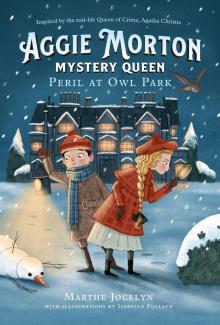 Peril at Owl Park
Peril at Owl Park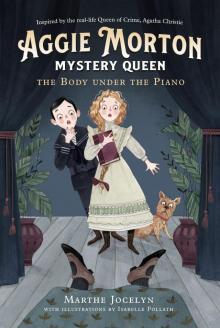 The Body under the Piano
The Body under the Piano Mable Riley
Mable Riley Earthly Astonishments
Earthly Astonishments How It Happened in Peach Hill
How It Happened in Peach Hill The Invisible Day
The Invisible Day The Invisible Harry
The Invisible Harry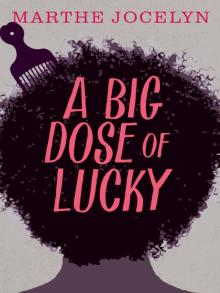 A Big Dose of Lucky
A Big Dose of Lucky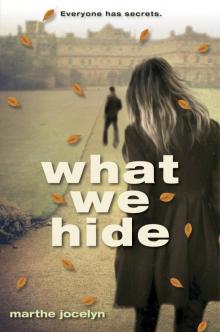 What We Hide
What We Hide Would You
Would You Secrets
Secrets First Times
First Times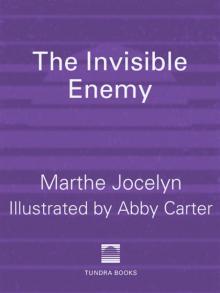 The Invisible Enemy
The Invisible Enemy Folly
Folly